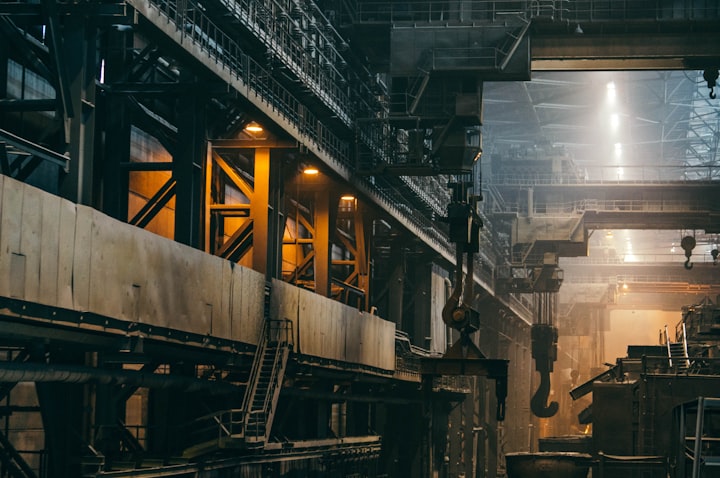Ponos Road
Ode to the factory worker

Before the reward there must be labor.
You plant before you harvest.
You sow in tears before you reap joy.
- Ralph Ransom
The Path of Ponos
The link between my neighborhood and two schools and two factories in my Ontario industrial town was a wide gravel path. This path, somewhat longer than a football field, snaked through a scrub meadow joining working-class neighborhoods. Almost every kid in my neighborhood walked on it, back and forth to the two schools. Almost every man in my neighborhood walked it too, heading for the smokestacks visible on the near horizon.
My father walked with them. The working men emerged from their homes and funneled onto the path like clockwork as though a great magnet drew them six times a day, back and forth: day shifts, afternoons, and night shifts; a cycle as sure and precise as the movements of the sun.
The wide path bisected a scrubby meadow where my friends and I played. Its landscape was dotted with frog-filled ponds and stunted trees. My friends and I often watched the factory men march along the path. Sometimes we'd crawl on our bellies, sneaking through the tall grass playing army, pretending they were the Nazis. As they walked, the men would occasionally smile or nod at me; precisely the time for me to wear a halo whenever I played in the field or walked the path home from school. "That's Andy's boy," they'd say, many of them knowing my father. Their acknowledgment of my presence would embarrass me and my friends because we did our best to hide from and stalk the ‘enemy’.
Their faded blue and green work pants and shirts were clean and ready, the spirit in their step a reliable indicator of the time. They were our watches during lazy summer days, appearing mid-afternoon when the afternoon shift began and the day shift ended.
A few walked alone, while others congregated in groups of two or three, talking boisterously during their walk to work. Swaying lightly from their hands were black or stainless-steel lunch pails, heavy with sandwiches and thermoses.
At three-fifteen another parade of men, a much different group, began their trek home. These men trudged home the opposite way, alone and silent, vacant eyes fixed out in space. Factory-blackened streaks smudged almost every face to anonymity, their clothes dirty and rumpled. Their now empty lunch pails seemed to weigh them down, secured tightly under their arms as if they’d drop from tired hands. Their day was done.
Older boys, some of them brothers of my friends, in time joined the procession like their fathers. Many of these boys had dropped out of school only too eager to don work clothes and pick up a paycheck. Soon, they were not the same boys; not boys at all. Their faces too were quickly smeared with the black grime of labor as they stepped into a new world that was a far different place than they likely imagined. Their friendly waves soon ceased. It seemed the factories were mouths and the path a throat that swallowed boys.
My father would come home dirty, tired, and beaten, often cursing his foreman or raging at some incident. By his ramblings, I thought it to be a horrible place to work, imagining it full of men no better than cruel prison guards. It took some time to purge the demons before he'd cooled off enough to grab a nap, or after a night shift, plunge into a morning sleep like a bat. I believed every factory worker had a similar temperament and did not care to be the object of their fury as they headed home. Coming home from school, I'd walk a make-believe gauntlet among the dirty, miserable men, attempting to remain inconspicuous for fear I'd raise their ire. It was a fine balancing act: never getting too close, hurrying to stay ahead, weaving quickly between them, akin to stickhandling a hockey puck. The invisible man would have envied my prowess.
A double-track rail line cut across the path at one end where freights would roar past many times a day. A ramshackle lean-to was planted crookedly at the intersection of the rail crossing and path.
Where evil lurked.
During school hours, the lean-to was inhabited by a fearsome old man. The kids christened him as ‘Shack’. He was an elderly man with a permanent scowl, wild bushy mustache, bad teeth, and clad in a long shabby coat. All of him was topped by a flattened black hat regardless of the weather.
Shack was the ugly troll on our path.
Most of the time he hid inside the shadow of the corrugated tin lean-to as though afraid of the sun like a worn-out vampire. As a crossing guard, he’d emerge just before freights approached, hoisting his stop sign, warning kids to keep clear. Some obeyed while others boldly dashed past. He'd never catch the offenders, but he’d charge out like a mad dog, his gravelly voice scaring the hell out of small kids while brandishing his sign-on-a-stick like a sword. Whenever occasional fights erupted between older schoolboys, Shack would break them up, taking no sides, chasing both parties away with stabs of the stop sign.
Shack always had a brief wave or a curt nod for the factory men, leading me to believe in the existence of a mysterious alliance in the adult world. For years as a small boy, Shack struck a terrible fear in me; he was a bogeyman, and his decrepit shack was a house of horror. My sister used to scare me, saying “he was in the yard last night” or he was “looking through the windows” and ‘he eats dead birds and kills cats’. The feathers were actually from chickens he’d plucked in his idle time.
As I grew older and braver, my friends and I tended to chuck stones or mud or snowballs at his lean-to; laughing, watching him charge out only to confront our retreating backsides.
We'd never do this with any factory men in sight.
If I gazed into a crystal ball back then would it show me following this path to the same factories? The men and factories were invisible to the schools and academia, totally ignored as if those massive, noisy, smoke-belching buildings blocks away never existed. Perhaps their code of silence was their way of encouraging the students to seek an alternate future.
It was only in my later years when I saw the inside of a factory, seeing how the grime came to smear every man’s face, however; I had seen my father at work. I was a very young boy and unfortunately, the experience was unsettling. The odd feeling stayed with me for some time.
One particular day he was unable to come home due to working overtime. Mom took me along. She didn't drive, so it was a long walk down the path and then onto the high wire fence that bordered the factory.
Men hollered indistinct instructions to a crane amidst mountains of long dark pipe that filled the yard at the sides of a wide gray building. Pipe was everywhere: skinny pipe and fat pipe, stacked like black matchsticks with colored chalk or paint on their ends. Others resembled fat brown cigars or large straws, large enough for me to walk inside without ducking my head.
Ear-splitting clangs and clanks like sharp out-of-tune bells hurt my ears, frightening me.
Diesel rail cranes roared back and forth sorting and loading. Late evening shadows gave the towering factory building an ominous appearance.
This was the place my father got dirty and cursed the world when he got home.
Behind the fence, a group of men sat on large square timbers at the base of a mountain of pipe. A teenager from a nearby cafe lifted large paper bags over the fence to them, took his payment, then scooted back across the road. The men ate heartily: tearing at their food and drinking from steaming paper cups. They were like feeding animals in a cage. Others talked and smoked, their faces unshaven, dirty, and sweaty, as if they’d emerged from the earth's core.
Mom stopped and examined their soiled faces. One man stood. His filthy face looked at us through smudged safety glasses--my father, but I wasn’t sure. He was barely recognizable with a welder's skull cap tight on his head.
He'd never come home this dirty. Shocking. What had they done to him in there?
He greeted my mom beside the fence. She beckoned me with nudges to say hello.
I wasn’t able to say a word to this strange man. He barely looked like my dad. With the cacophony of clanging pipe and strange carbon smells, my senses were overwhelmed. I gripped my mother's arm tighter, staring at this vaguely familiar man. The other men beside him cajoled me to speak, but their sooty-streaked faces scared me. I shied away.
Finally, Mom passed some dollars to him through the wire and pulled me away to safety back along the fence. The sky had darkened. Dim orange bulbs cast eerie pools of light against the massive factory building. Brilliant floodlights on lofty poles illuminated the stacks of pipe just like the lights at Burgar Park during baseball games.
I was afraid to ask my mother what was in the brown paper bag the men ate from. Sometimes Dad returned home with a half-empty lunch pail making me wonder if he’d eaten that day from the café’s brown bag. Raiding his leftovers was a special treat; devouring a peanut butter and jam or mustard and baloney sandwich.
Ricky, a friend of mine, had a father who arrived home from work at precisely five-ten every day. The man appeared exactly as if he just left for work: clean suit and tie, scrubbed face, and not a hair out of place. Did he actually do some work?
I asked my friend what kind of job his father did.
"I don't know," he said, shrugging. "He works in an office."
I pressed him further but could only elicit vague statements about his father such as "sits at a desk". It sounded unusual to me, as I did the same at school or home. Ricky’s dad came home and never growled up a storm or cursed like my father. The man sat calmly in the kitchen reading a newspaper or taking off his tie while staring out the window at his backyard.
I asked my dad what he did at the factory. He sat at the table in a sleeveless white T-shirt, the stubbled hairs on his face creating a dark shadow.
"I'm a welder," he said, pride evident in his voice. "I make pipe…for all over the world."
Whenever we drove past the factory, I’d see the long stacks of pipe stretched out, piled high as mountains, as if they'd been there forever. I knew my father's hands had fashioned them all.
For years on end and across generations, the spirit of Ponos, the Greek God of Labor, walked with them.
Now the path is a fading memory built over with new homes. I may be the only one to remember.
The End
About the Creator
E. R. Yatscoff
World traveller and adventurer. Retired fire rescue officer. From Canada to China to Russia to Peru and the Amazon. Award winning author of crime novels, travel and short stories.






Comments
There are no comments for this story
Be the first to respond and start the conversation.